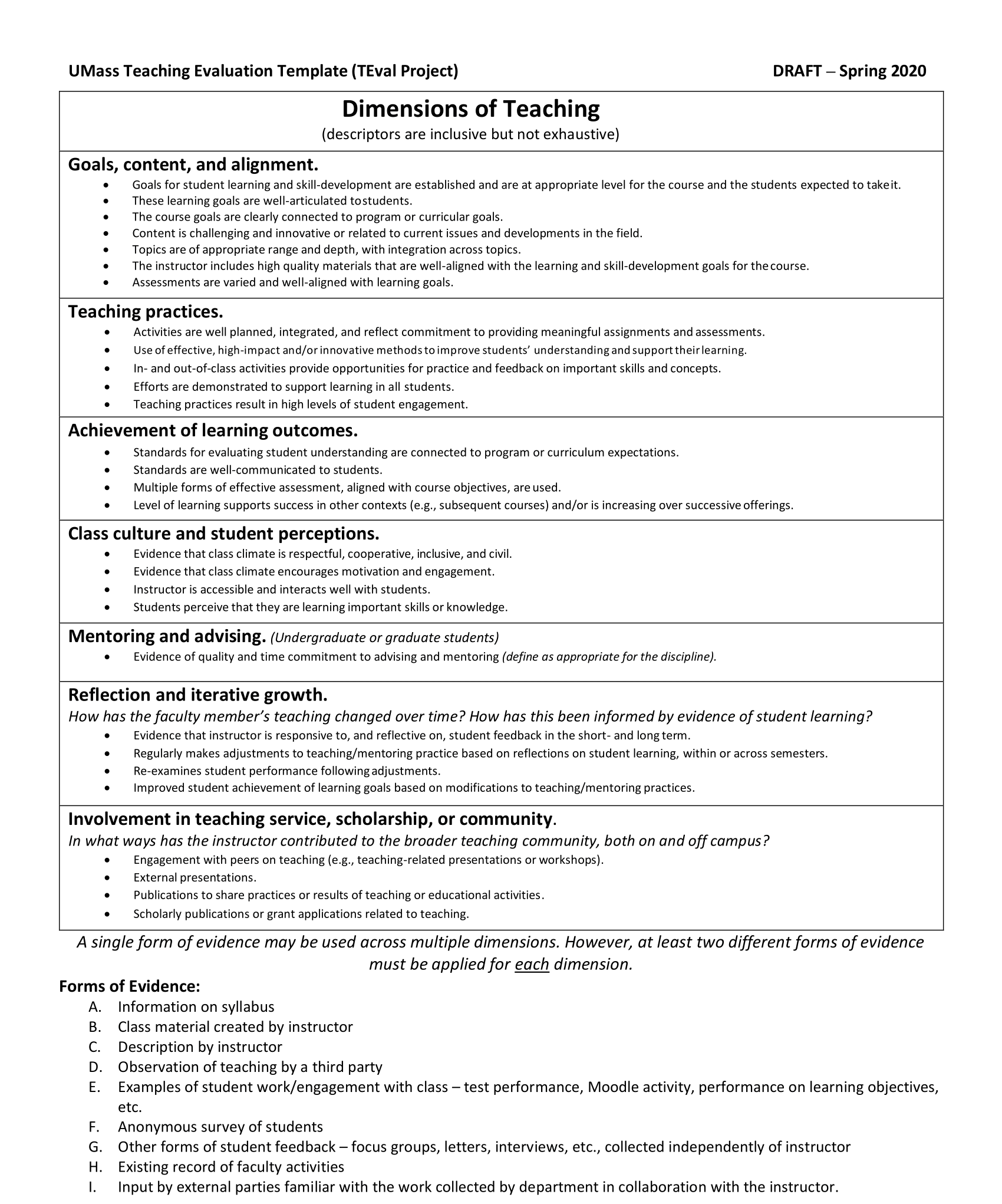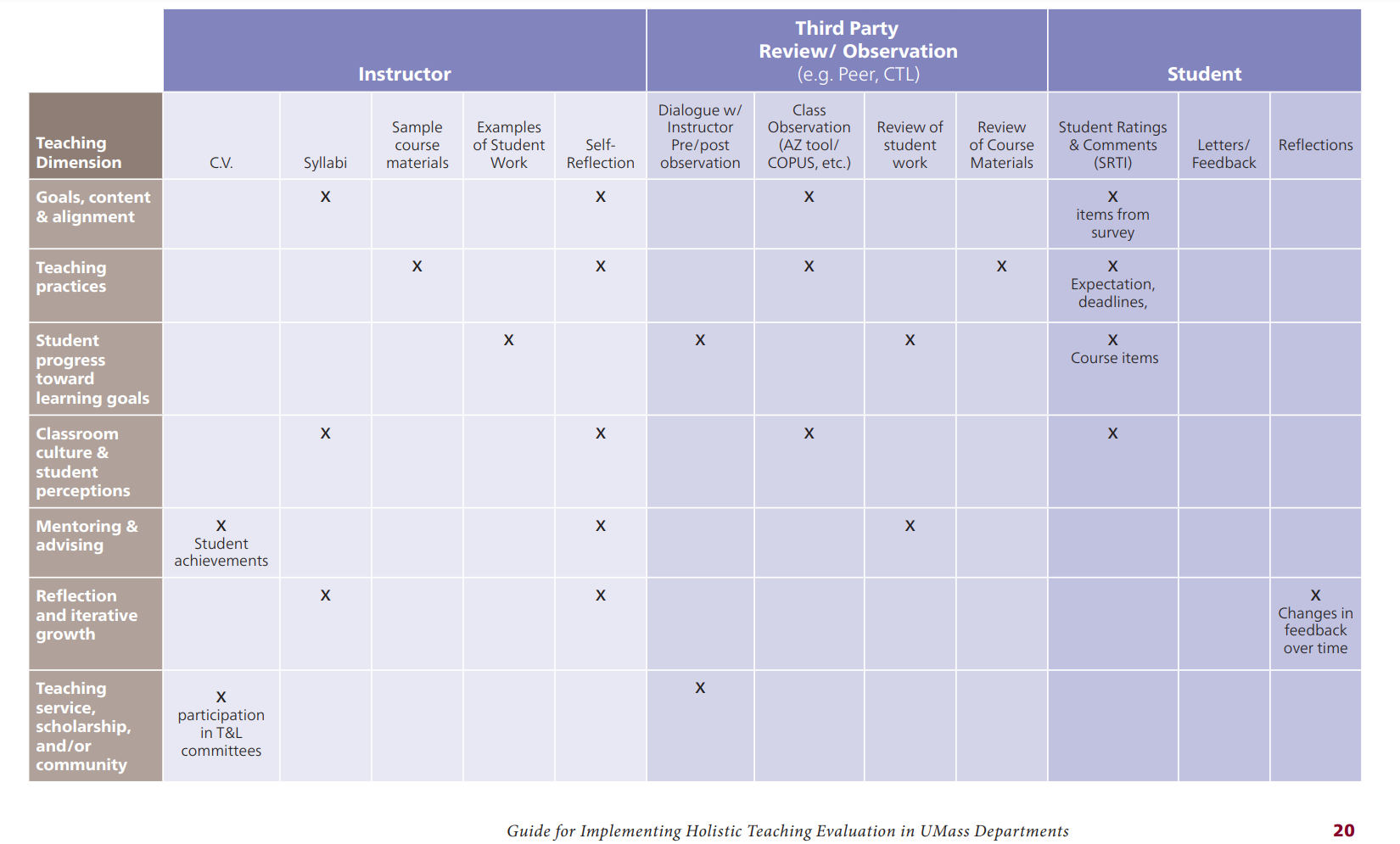Sites -> UMass Amherst
Visit the UMass Amherst TEval webpages.
 The TEval project at the University of Massachusetts, Amherst (UMass) is a collaboration between
the Office of Academic Planning and Assessment (OAPA) and the educational initiatives area of
the Office of the Provost. The effort resulted from a task force review of external research about
and processes for teaching evaluation, resulting in an internal white paper with recommendations
for the UMass community. That task force was co-led by the directors of the OAPA and the UMass
Center for Teaching Excellence and Faculty Development (TEFD), and its work preceded the funding
of TEval by the National Science Foundation (NSF). The team recommended expanding campus
approaches to teaching beyond student evaluations and that a model based on the KU Benchmarks
work be adapted and implemented at UMass.
The TEval project at the University of Massachusetts, Amherst (UMass) is a collaboration between
the Office of Academic Planning and Assessment (OAPA) and the educational initiatives area of
the Office of the Provost. The effort resulted from a task force review of external research about
and processes for teaching evaluation, resulting in an internal white paper with recommendations
for the UMass community. That task force was co-led by the directors of the OAPA and the UMass
Center for Teaching Excellence and Faculty Development (TEFD), and its work preceded the funding
of TEval by the National Science Foundation (NSF). The team recommended expanding campus
approaches to teaching beyond student evaluations and that a model based on the KU Benchmarks
work be adapted and implemented at UMass.
UMass has produced a thorough guide for implementing TEval at the departmental (and institutional) levels.

Each year of the first three years of TEval, the UMass leadership team selected departments from among those applying to participate in adapting and implementing a form of the Benchmarks rubric.

The applications submitted for participation needed to demonstrate the department’s commitment to expanding their approach to teaching evaluation, describe how the effort would be a departmentwide one, and be co-led by the Head or Chair in addition to one or more faculty members. By supplementing NSF funding with funding from the Office of the Provost, departments from both STEM and non-STEM disciplines have been included in each of the three cohorts.
To date, nine departments (four non-STEM, five STEM), representing four Colleges (Public Health and Health Sciences; Information and Computer Sciences; Humanities and Fine Arts; Natural Sciences) are involved. One or two members from each participating department attend bi-weekly cross-departmental meetings with the project leadership team. These meetings allow for exchange of information between the leadership team and the participating departments, as well as among faculty from different departments. Importantly, these regular meetings serve to establish a learning community among those engaged in the process of transforming their departmental approach to the evaluation of teaching. The leadership team also meets with each participating department individually at least once per semester. If a department requests them, additional support or meetings are also arranged. Departments that began the project as part of the first cohort are still involved, which has allowed a natural peer-mentoring dynamic to emerge, while the multidisciplinary nature of the group cross-fertilizes ideas among participants.
The engagement of upper-level administration in the UMass effort has proven vital in maintaining forward momentum for the work. The initial task force was launched with support of the Provost, and the NSF-supported work has been reported at regular intervals to that office. In addition, leaders of the faculty union at UMass have been informed of the efforts from the time the task force white paper emerged. Engagement of these two groups has recently resulted in new wording being negotiated for the faculty contracts, which requires multiple sources of information being considered for teaching evaluation. While faculty have expressed a desire for evaluation methods beyond just student surveys, the effort required to integrate new approaches into the normal operations of departments involves time and work that many participants had not anticipated. Their dedication to date has been buoyed by the knowledge that the work may result in a template for campus-wide change, and that it is being supported by both the faculty union and the administration. Similarly, those changes would likely not be embraced if they were dictated from above rather than nurtured from within.
